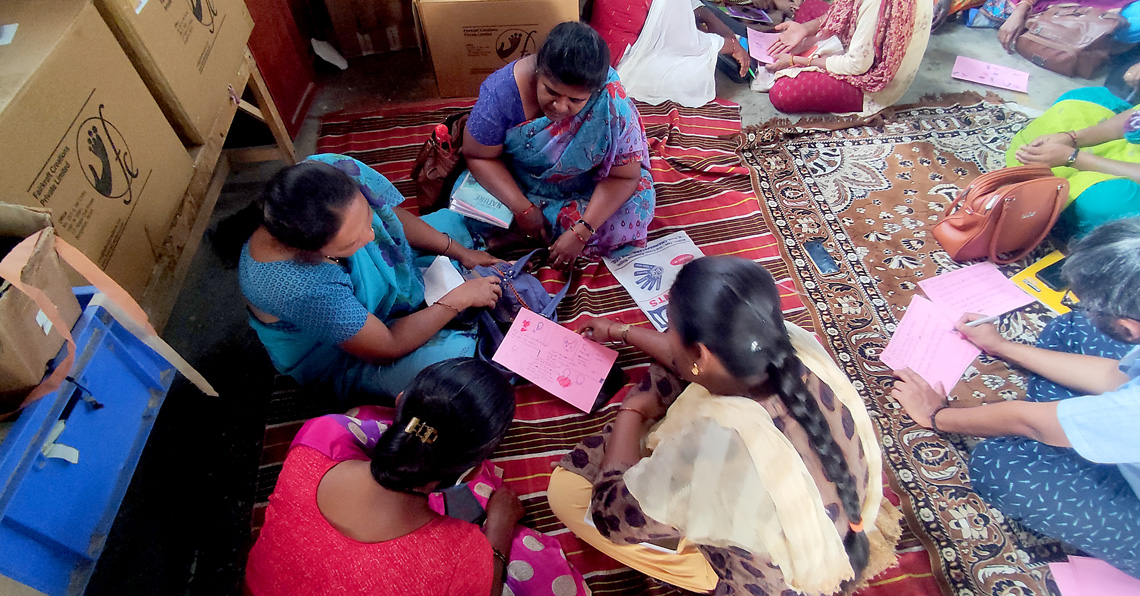Design Beku: Glimpses into our situated practice of collective design
Issue: XXIX.5 September - October 2022Page: 24
Digital Citation
Authors:
Naveen Bagalkot
Design Beku (https://designbeku.in/) is a collective that strives to make design and technology more locally rooted, contextually relevant, and ethical [1]. Since 2016, we have been working with the women community health navigators (HNs) trained and supported by MAYA Health (https://bit.ly/3oZBb9a) in and around Channapatna, a town in India 70 kilometers southwest of Bangalore. In 2021, we started to collaboratively build on the idea of a community-owned local health knowledge repository [2], enabled by a community wireless network [3] and a "feminist server" [4]. The work happens on-site in a weekly rhythm. On weekdays, using the protocol they codesigned, the HNs collect narratives, health experiences, traditional knowledge and practices, and other information from local communities in the form of audio, video, and photos. Every Saturday we meet at the Artisanpride Producer Company (https://bit.ly/34Kkxns😉, where we have set up four LTE SIM routers, which the HNs use to upload and annotate the narratives they have collected on Papad (https://open.janastu.org/projects/papad), an open-source hypermedia markup and annotation tool designed by Janastu, our collaborator on the project.
 |
The HNs using the LTE SIM routers to upload the narratives they collected during the weekdays on Papad, while discussing and annotating in smaller groups. |
We also work periodically on conceptualizing the Channapatna Health Library, as the HNs call the archive, its potential usages, and its sustainable future through engaging in speculative design sessions.
We collaborate closely with Janastu to design and develop the community network hardware and software components. Periodically we meet with Janastu members at IruWay farm (https://iruway.janastu.org/), where we learn the networking tools that we use in Channapatna and collaboratively sketch and tinker with Papad and other software tools, enabling the building of the archive.
The feminist server is something that we want to foster among the grassroots communities we work with. As part of an artist's residency at Khoj Studios [5], Padmini Ray Murray (conducted participatory workshops titled "Who Data Thinks We Are" with local youth, culminating in a video game showcase explaining why we need feminist servers.
On weekdays, the HNs collect narratives, health experiences, traditional knowledge and practices, and other information from local communities.
As a way to support the scaling of community-driven learning across multiple geographic locations, we are working with Enable India (https://www.enableindia.org/) and its rural partners to collaboratively archive the everyday experiences of both people with disabilities and the people who support people with disabilities in gaining secure employment. The work involves facilitating participatory sessions where we envision the modules of the archive as well as enact the emerging practices of archiving, driven by the actual work of collecting, annotating, and building the digital archive.
 |
The rural partners of Enable India imagining an archive of their everyday experiences, while enacting the activities of collection and annotation, in a workshop facilitated by Design Beku. |
 |
Participants reflect on their own personal data use in a workshop conducted by Padmini Ray Murray entitled "Who Data Thinks We Are" at Khoj Studios, Delhi. |
 |
Design Beku and Janastu participants at IruWay farm, collectively listening to and annotating audio narratives from Channapatna to identify aspects of Papad that needed better design. |
1. Murray, P.R., Bagalkot, N.L., Srivatsa, S., and Anthony, P. Design Beku: Toward decolonizing design and technology through collaborative and situated care-in-practices. Global Perspectives 2, 1 (2021), 26132; https://doi.org/10.1525/gp.2021.26132
2. https://www.apc.org/en/exploring-potential-community-owned-health-knowledge-infrastructure-cowhki-enhance-community-health
3. Bidwell, N.J. Decolonising in the gaps: Community networks and the identity of African innovation. In Re-imagining Communication in Africa and the Caribbean. Palgrave Macmillan, 2021, 97–115.
4. Gendersec. Servers: From autonomous servers to feminist servers, 2022; https://gendersec.tacticaltech.org/wiki/index.php/Servers:_From_autonomous_servers_to_feminist_servers
5. https://khojstudios.org/project/a-fever-dream-of-a-feminist-internet/
Naveen Bagalkot is a design researcher, educator, and facilitator working at the intersections of human-computer interaction, participatory design, and community-based care. As a cofounder of the Design Beku collective, he focuses on facilitating collaborative design and critical making for and with grassroots community organizations such as MAYA Health and Enable India. [email protected]
Copyright held by authors
The Digital Library is published by the Association for Computing Machinery. Copyright © 2022 ACM, Inc.



